DRIVERS REACT TO WEDNESDAY’S NHRA ANNNOUNCEMENT
At their core, NHRA Full Throttle Series national events are entertainment.
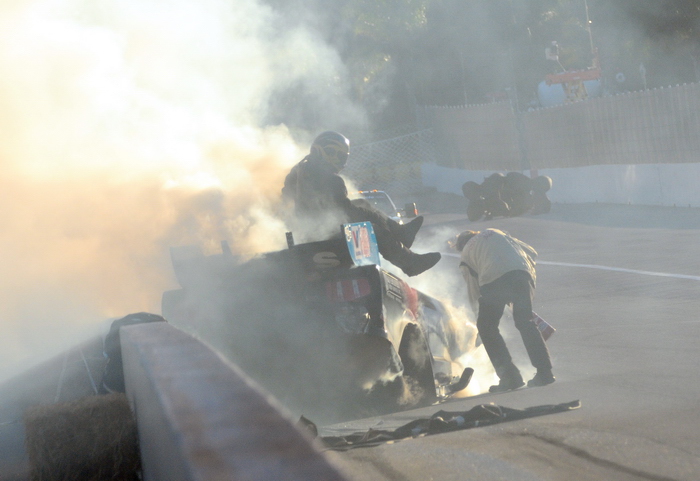
Thus, to improve the quality of their races for the fans, the sanctioning body announced Wednesday it is implementing stiffer penalties to reduce lengthy downtime because of oildowns and improve track preparation.
In 2011, when Top Fuel, Funny Car, Pro Stock and Pro Stock Motorcycle drivers oildown the track, they will be subject to fines and championship point deductions.
For its part, the NHRA is increasing its track prep and oildown clean-up capabilities by adding additional equipment to the Safety Safari, including a second drag tractor.
Lee Beard, a championship crew chief and team manager, applauded the NHRA for taking action. Beard is returning to his familiar role as a crew chief in 2011 as the wrench boss for the new Funny Car team with driver Johnny Gray at Don Schumacher Racing. Beard also will remain in his position as DSR’s team manager.
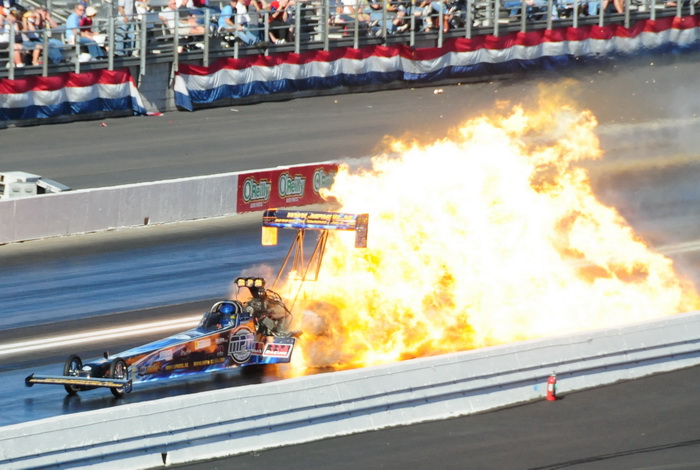
At their core, NHRA Full Throttle Series national events are entertainment.
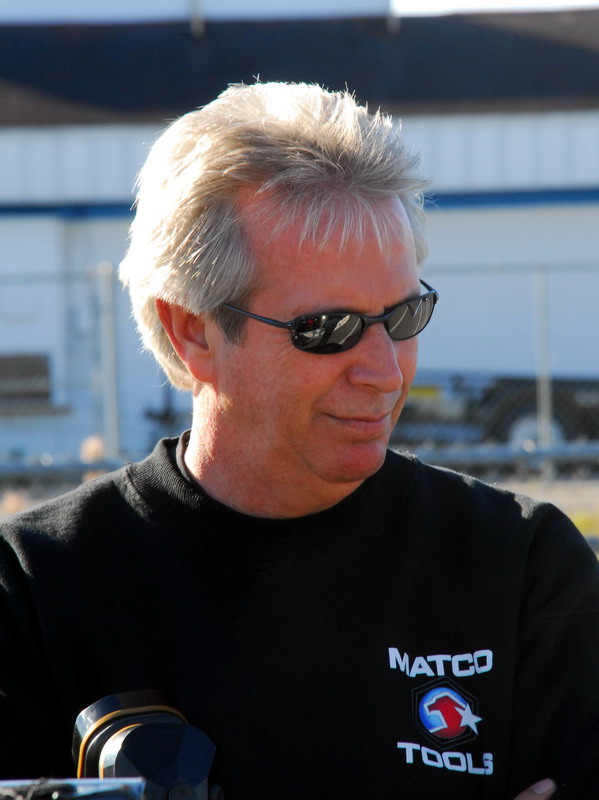
In 2011, when Top Fuel, Funny Car, Pro Stock and Pro Stock Motorcycle drivers oildown the track, they will be subject to fines and championship point deductions.
For its part, the NHRA is increasing its track prep and oildown clean-up capabilities by adding additional equipment to the Safety Safari, including a second drag tractor.
Lee Beard, a championship crew chief and team manager, applauded the NHRA for taking action. Beard is returning to his familiar role as a crew chief in 2011 as the wrench boss for the new Funny Car team with driver Johnny Gray at Don Schumacher Racing. Beard also will remain in his position as DSR’s team manager.
“As racers, we need to put on the best possible show for the spectators that we can,” Beard said. “They’re the ones who buy the tickets and sit in the stands and watch (the races) on television. I think it is kind of sad that the sanctioning body has to make rules like this to fine drivers and deduct points. But, as entertainers we have to realize the spectators are the ones who are paying for the show. I like the rules (the NHRA has put in place). I’m looking at it, as a crew chief who is confident in my ability to tune the engine properly and not have it blow up.”
Veteran Funny Car driver Ron Capps, who drives for DSR, agreed with Beard.
“We have to gravitate toward being a better sport for spectators, and for the fans who come to a professional race to see professional drivers,” Capps said. “Having six and seven-hour race days on a Sunday for somebody who is bringing their family to the race is too long. Worst than that is bringing out executives from a sponsor or Fortune 500 company, whether it is your current sponsor or somebody you want to get (to sponsor you) and having them stick around two, three or four hours later than they expected to. That is embarrassing.”
According to the NHRA, during the 2010 season, Top Fuel and Funny Car oildowns were responsible for 31 hours and 59 minutes of downtime in 2010.
At the start of the upcoming season, which begins Feb. 24-27 at the Winternationals in Pomona, Calif., Top Fuel, Funny Car, Pro Stock and Pro Stock Motorcycle teams will receive their one and only oildown credit for the season. The credit will absolve the team of any penalty resulting from their first oildown violation of the season.
The next violation by a pro team will result in a $1,000 fine. If the violation occurs during qualifying, it will result in a loss of five points and the loss of elapsed time and speed for the run. Times will be voided for qualifying position, qualifying performance points, session run order and national records. During eliminations, a violation results in a $1,000 fine plus a loss of 10 points and the loss of elapsed time and speed for the run.
If the oil violation occurs on a winning run, the driver will advance, but will lose lane choice and run order selection for the next round, and the performance will not be eligible for national record consideration.
Second violations at the same event will result in a $2,000 fine plus a loss of 10 points in qualifying and 20 points in eliminations.
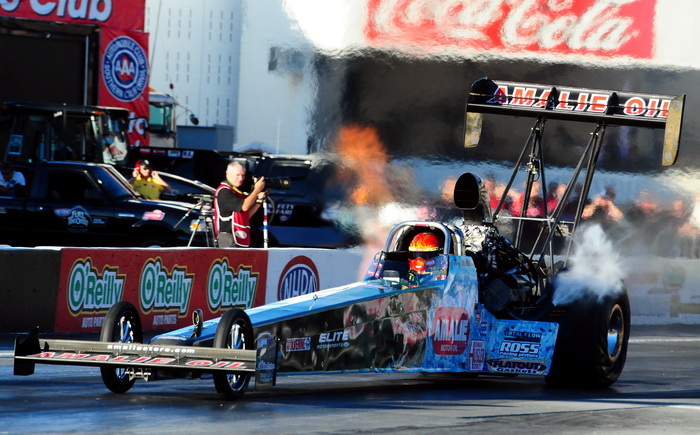
“Let’s put it this way, if the penalty for speeding was the death penalty, you would not see too many people speeding,” Beard said. “If the penalty for speeding is a $5 ticket, you’re going to see a lot of people hauling ass down the interstate. The effect of the (NHRA) rule will do what really needs to be done, and that’s fix the sport from all the delays.”
Robert Hight, the 2009 Funny Car world champion for John Force Racing, wasn’t surprised by the NHRA making these revisions.
“They had to make some major changes to speed up the show and not have any more races like we had at Vegas (last October),” Hight said. “These are their (NHRA) rules and we have to play by them. The only thing I wish is that there was some sort of reward system throughout the year for somebody who doesn’t oildown the track. It is the same for everybody and we’re just going to have to do the best that we can.”
Another area NHRA is addressing to speed up its races is reducing the turnaround time between second and third round and third round and the finals.
First to second round turnaround time will remain at 75-minutes, second to third round will reduce to 65-minutes, and the NHRA is experimenting with 60-minutes from third round to final. Average scheduled time between qualifying sessions will be between 1½ to 2 hours.
“I think tightening things up between rounds is going to be hard for everybody to get together and do it, but that is the right direction we need to go,” Capps said.
Hight, meanwhile, doesn’t see shortening the time between rounds as a big deal.
“The way I see it, we have been pushed (between rounds) before,” Hight said. “There have been a lot of races where we have had rain coming or maybe the race got started a little late due to weather and we have got pushed to 65 minutes between rounds and we have never had a problem. So, I do not see that being a big issue.”
Capps thinks track preparation also is a key factor in reducing oildowns.
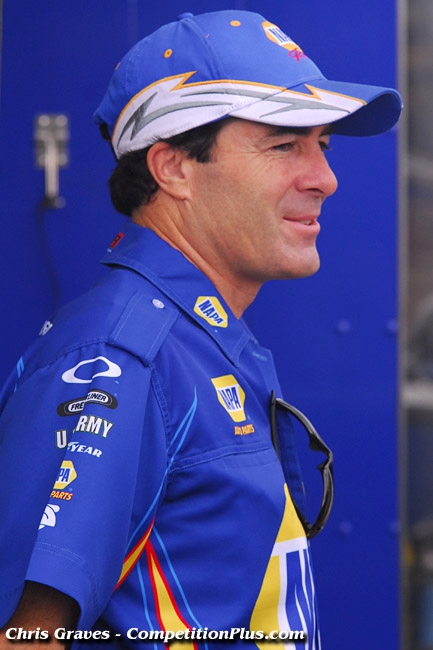
Beard thinks the new policies will force teams to upgrade their equipment.
“With those penalties in the place, the domino effect will be that the racers and engineers will come up with the absolute best containment systems,” Beard said. “We need to have containment systems that contain the oil, so oil does not get on the track. These penalties also will bring out the cream of the crop as far as the guys who are able to tune the engines and get the maximum performance out of them without blowing them up. I have seen national record runs made and the engine is pristine. So, to get the maximum performance out of an engine, you do not have to damage it.”
Capps concurred with Beard.
“The bottom line is containment,” Capps said. “I’m not going to mention names, but there were several teams, one team that won a championship, that had a lot of oildowns. Then, you talk about another team that won a championship that might have had just as many oildowns as everybody else, but they didn’t spill a drop of oil on the track because their containment system was better than everybody else’s. I think that is where you’re going to see most of the engineering and the time spent is making our containment systems be the best they can be.”
Beard cited the Army dragster driven by Tony Schumacher as example how a team can excel with minimal oildowns.
“The Army dragster had one oildown for the entire 2010 season,” Beard said. “What that shows you is that it is possible to run in front of the pack and get the most performance out of a vehicle and have the engine not suffer any damage.”
Terry McMillen, who pilots the Amalie Oil dragster, believes NHRA’s announced changes will have a bigger impact on lower budget teams like his.
“The economy is tough out there,” said McMillen, who finished 11th in the Top Fuel point standings a year ago. “I do not care if you are John Force or Schumacher or whoever. It is going to impact those teams, but it is certainly going to impact the smaller independent teams. The thing that is frustrating to me is that enough damage has been caused if you just broke your motor. I do not think people go up there on purpose to oildown the track. I understand they (NHRA) have to fix the problem because it is a huge problem. I just really wish they would attack the teams that oildown the track more consistently. New teams starting out who are trying to do this (race) in the NHRA on a limited budget; it is tough. Plus, the other side of that is most of the good or great crew chiefs are taken by the multi-car teams. Other (smaller) teams could eliminate oildowns if they just had better guidance. To me the fines, as a lower-budget team, are going to affect whether I can finish the year and I know others are in the sa
me position as me.”
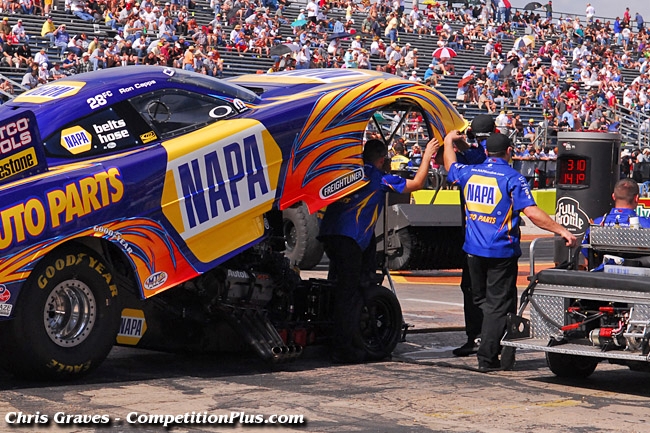
Beard also believes the new NHRA rules will change how owners approach putting together their respective teams.
“The biggest effect will be on the team owners,” Beard said. “The team owners are certainly not going to hire crew chiefs and crew members that the only way they know how to run a car is with a lot of damage and a lot of oil on the race track. So, the team owners will have to be very selective about who they hire to race their cars. In the past several years when there weren’t any penalties or the penalties were very light, there were some guys who were in charge of running (some) cars, who probably should not have been. What this will do, from my perspective, adds value to the crew chief who is capable of making a car perform, but at the same time with very minimal parts damage.”
And, Capps sees drivers as part of the solution for the oildown issue.
“There were times when you’re sitting back in the staging lanes and you’re hearing the driver slap the throttle three and four times when they didn’t need to,” Capps said. “Things like that do nobody any good. You have to look at the situation you’re in. There are times when you’re not qualified, and you have to do what you have to do to get the car down the track. There are also times when we have seen a driver up there trying to get in the show and the bump spot that is up there on the scoreboard is attainable only by a quick pedal and a catch of the car, and if it hooks up, it has a chance of making it. But, if somebody goes out and pulls the tires loose, and they get in and out of throttle a couple times, you know they’re not going to make the show and they annihilate the engine and oildown the track. We saw that case a lot (last year). Personally, I take pride in trying to know when my car is not happy. As a driver, you have to look at the big picture. I think with this new rule drivers are going to be more attentive to what the car is doing and how it sounds. Instead of just hitting the gas and driving it down there and like you do not even own it.”
| {loadposition feedback} |
{source}
<div style="float:left; padding:5px;"><script type="text/javascript">
google_ad_client = "pub-8044869477733334";
/* 300x250, created 4/3/09 */
google_ad_slot = "2028912167";
google_ad_width = 300;
google_ad_height = 250;
</script>
<script src="http://pagead2.googlesyndication.com/pagead/show_ads.js" type="text/javascript"></script>
</div><div style="padding:5px;">
<script type="text/javascript">
 sr_adspace_id = 2000000613807;
sr_adspace_id = 2000000613807; sr_adspace_width = 300;
sr_adspace_width = 300; sr_adspace_height = 250;
sr_adspace_height = 250; sr_ad_new_window = true;
sr_ad_new_window = true; sr_adspace_type = "graphic";
sr_adspace_type = "graphic";</script>
<script type="text/javascript" src="http://ad.afy11.net/srad.js?azId=2000000613807">
</script></div>
{/source}



